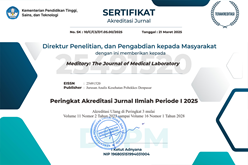EFEKTIVITAS EKSTRAK KAPANG ENDOFIT ISOLAT BR-S1 (A) TERHADAP BAKTERI Methicillin-Resistant Staphylococcus aureus (MRSA)
DOI:
https://doi.org/10.33992/m.v6i2.417Keywords:
endophytic fungus extract, tea parasitic plant, MRSA bacteriaAbstract
Background Tea parasitic plant (Scurrula oortiana L.) is one of medicinal plants (herba medicina) containing several active compounds but its utilization is still constrained by some problems, so that there needs other approaches by utilizing potential of BR-S1 (A) isolate endophytic fungi which grows in these plants to control MRSA pathogenic bacteria.
Objective This research aimed to examine the effectiveness of the four types of BR-S1 (A) endophytic fungi extract from the origin of tea parasites to the growth of MRSA bacteria.
Methods The researchers used laboratory experimental method by Kirby Bauer disk diffusion method and the data obtained were analyzed statistically.
Result The research result showed that MRSA bacteria had various sensitivity on four types of BR-S1 (A) isolate endophytic fungi; with its highest sensitivity on extract of ethyl acetate and its lowest sensitivity was extract of n-hexane (no inhibition). The difference of sensitivity test results was suspected to be related to active compound content found in ethyl acetate extract in form of flavonoid and tannin class compounds which had been proven to inhibit growth of pathogenic bacteria.Â
Conclusion It can be concluded that  the four types of BR-S1 (A) endophytic fungus extract originating from tea parasites, only ethyl acetate extract was the most effective in inhibiting the growth of MRSA bacteria, this is due to the content of two active compounds from the flavonoid and tannin groups.
Downloads
Published
Issue
Section
Citation Check
License
- Articles published in Meditory are licensed under a Creative Commons Attribution-ShareAlike 4.0 International license. You are free to copy, transform, or redistribute articles for any lawful purpose in any medium, provided you give appropriate credit to the original author(s) and Meditory, link to the license, indicate if changes were made, and redistribute any derivative work under the same license.
- Copyright on articles is retained by the respective author(s), without restrictions. A non-exclusive license is granted to Meditory to publish the article and identify itself as its original publisher, along with the commercial right to include the article in a hardcopy issue for sale to libraries and individuals.
- By publishing in Meditory, authors grant any third party the right to use their article to the extent provided by the Creative Commons Attribution-ShareAlike 4.0 International license.




